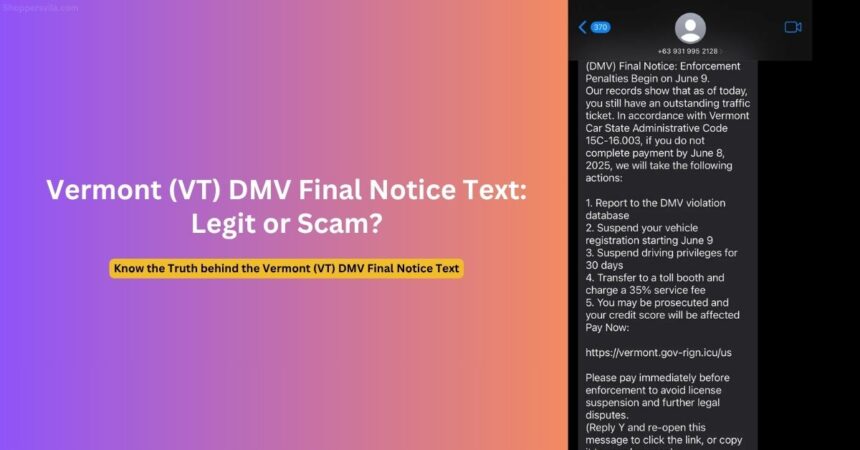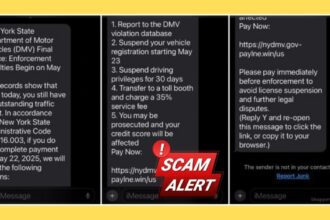A sophisticated text message scam targeting Vermont residents has emerged across the Green Mountain State, with cybercriminals impersonating the Vermont Department of Motor Vehicles (DMV) to harvest personal and financial information. Thousands of Vermonters from Burlington to Brattleboro have received fraudulent “final notice” messages about alleged unpaid traffic violations, prompting urgent warnings from state authorities and law enforcement agencies.
Overview of the Vermont (VT) DMV Text Scam
The Vermont DMV Final Notice Text Scam represents a coordinated cyber attack specifically targeting Vermont residents through fraudulent text messages claiming to be official communications from the Vermont Department of Motor Vehicles. This sophisticated phishing operation has rapidly spread throughout Vermont’s 14 counties, affecting communities from the shores of Lake Champlain to the Connecticut River Valley.
The scam exploits Vermonters’ civic responsibility and concern about potential legal consequences by impersonating one of the state’s most trusted government agencies. Fraudsters create artificial urgency through threatening language about license suspensions, registration holds, and legal action to pressure victims into providing sensitive personal and financial information through malicious websites designed to mimic legitimate government portals.
Vermont State Police and DMV officials emphasize unequivocally: The Vermont Department of Motor Vehicles does not send unsolicited text messages regarding traffic violations, outstanding fines, or enforcement actions. All such communications are fraudulent attempts designed to steal personal information and commit identity theft.
Scope of Impact Across Vermont
The Vermont DMV traffic tickets text scam has affected:
- Residents across all Vermont counties from Chittenden to Essex
- Long-time Vermonters who haven’t received citations in decades
- College students attending Vermont universities
- Seasonal residents and tourists with Vermont connections
- Former Vermont residents maintaining ties to the state
- Individuals without current driver’s licenses or registered vehicles
Reports indicate this Vermont department of motor vehicles outstanding traffic ticket text has generated hundreds of complaints to Vermont State Police, the Attorney General’s office, and consumer protection organizations throughout New England.
How the DMV Final Notice / Outstanding Traffic Ticket Scam Works
The Vermont DMV Final Notice Text Scam employs a sophisticated multi-phase psychological manipulation strategy specifically designed to exploit trust in Vermont’s government institutions:
1. Target Acquisition and Mass Distribution
Scammers acquire Vermont phone numbers through various sophisticated methods:
- Data breaches from Vermont businesses and organizations
- Social media harvesting targeting Vermont residents
- Public records mining from Vermont government databases
- Automated generation targeting Vermont area code 802
- Purchase of contact lists from illegitimate data brokers
2. Psychological Exploitation Phase
The fraudulent messages trigger immediate emotional responses designed to bypass critical thinking:
- Authority Impersonation: Leverages trust in Vermont government institutions
- Fear Induction: Threatens loss of driving privileges and legal consequences
- Urgency Creation: Imposes unrealistic deadlines for immediate action
- Financial Pressure: Mentions additional fees and credit score damage
- Legitimacy Facade: Uses official-sounding language and fake legal codes
3. Information Harvesting Strategy
Victims who engage with the scam encounter progressive data collection phases:
- Initial website visit logs device and location information
- Fake verification forms request personal identifying details
- Payment pages capture complete credit card and banking information
- Follow-up communications may request Social Security numbers and additional sensitive data
4. Financial and Identity Exploitation
Once scammers obtain victim information, they typically:
- Make immediate unauthorized charges to captured credit cards
- Attempt comprehensive identity theft using collected personal data
- Sell complete identity packages to other criminal organizations
- Use victim information for additional targeted fraud schemes
- Open new accounts and loans in victims’ names
Fake Text Message Patterns and Examples
Primary Fake Vermont DMV Text Example:
Vermont Department of Motor Vehicles (DMV) Final Notice:
Enforcement Penalties Begin on June 9.
Our records show that as of today, you still have an outstanding
traffic ticket. In accordance with Vermont Car State Administrative
Code 15C-16.003, if you do not complete payment by June 8, 2025,
we will take the following actions:
1. Report to the DMV violation database
2. Suspend your vehicle registration starting June 9
3. Suspend driving privileges for 30 days
4. Transfer to a toll booth and charge a 35% service fee
5. You may be prosecuted and your credit score will be affected
Pay Now: https://vermont.gov-rign.icu/us
Please pay immediately before enforcement to avoid license
suspension and further legal disputes.
(Reply Y and re-open this message to click the link, or copy
it to your browser.)
Alternative Vermont Scam Variations:
Winter Driving Citation Version:
Vermont DMV Alert: Unpaid winter driving violation $89.50
Issued during recent snow emergency. License suspension
scheduled June 12, 2025. Pay immediately: [MALICIOUS LINK]
Registration Renewal Scam:
Vermont DMV Notice: Vehicle registration #VT-2025-XXXX
expired. Immediate renewal required. $150 penalty added.
Renew now to avoid towing: [FRAUDULENT URL]
Inspection Violation Version:
Final Notice: Vermont state inspection overdue.
$200 fine plus court costs. Pay online before
warrant issued: [FAKE LINK]
Out-of-State Violation Scam:
Vermont DMV: Outstanding violation from neighboring state.
Interstate compact violation $125. Immediate payment required:
[SCAM URL]
Critical Red Flags to Identify DMV Scams
Phone Number Warning Indicators:
- Non-Vermont origins: Messages not from 802 area code for official state business
- International routing: Country codes like +63 (Philippines), +91 (India)
- Spoofed local numbers: Calls appearing local but routing internationally
- Bulk messaging patterns: Identical timestamps across multiple recipients
- Unregistered government numbers: Numbers not associated with verified state agencies
Content and Language Red Flags:
Legal Citation Fabrications:
- “Vermont Car State Administrative Code 15C-16.003” – This statute does not exist
- Vermont uses Vermont Statutes Annotated (VSA) title and section format
- Real citations reference specific VSA titles (Title 23 for motor vehicles)
- Legitimate notices include actual violation codes from Vermont law
- “Toll booth” references – Vermont has no toll roads
Linguistic and Formatting Inconsistencies:
- Generic addressing without specific personal or violation details
- Grammatical errors inconsistent with professional government communication
- Inconsistent formatting compared to authentic Vermont DMV correspondence
- Unusual payment instructions not matching Vermont government protocols
- Non-standard terminology like “Car State Administrative Code”
Technical Security Red Flags:
- Fraudulent domains: Real Vermont government sites use vermont.gov exclusively
- Suspicious URL structures: Random characters and foreign domain extensions
- Insecure connections: Absence of proper SSL certificates and security protocols
- Broken website functionality: Only payment processing works on fake sites
- Mobile-specific targeting: Websites designed only for mobile device exploitation
Procedural and Administrative Red Flags:
- Immediate payment demands: Real violations include appeal periods and due process
- Weekend enforcement timing: Vermont government offices don’t issue urgent weekend notices
- Text-only official communication: Vermont DMV uses certified mail for legal notices
- Lack of violation specifics: Real citations include comprehensive details
- No official contact information: Legitimate notices provide verified phone numbers and addresses
How to Identify and Protect Yourself from Fraudulent Vermont (VT) DMV Texts
Verification and Authentication Strategies:
1. Official Channel Verification Protocol
- Contact Vermont DMV directly: (802) 828-2000
- Visit official website: dmv.vermont.gov
- Check driving record through myDMV Vermont portal
- Visit local DMV office for in-person verification
- Contact Vermont State Police: (802) 244-8727 for fraud reporting
2. Document and Communication Authentication
- Compare message format with legitimate Vermont DMV communications you’ve received
- Verify any citation numbers through official Vermont court systems
- Check for official Vermont state letterhead and contact information
- Confirm violation details match your actual driving history and vehicle registration
- Cross-reference dates and locations with your personal records
Comprehensive Protection Strategies:
Immediate Security Implementation:
- Never click links in unsolicited text messages from any source
- Avoid downloading attachments from unknown or suspicious sources
- Don’t provide personal information through text, email, or phone unless you initiated contact
- Report suspicious messages immediately to multiple agencies for investigation
Advanced Digital Protection Measures:
- Enable comprehensive spam filtering on all mobile devices and carriers
- Install reputable call and text blocking applications
- Monitor credit reports from all three bureaus monthly
- Set up fraud alerts with financial institutions for all accounts
- Use strong, unique passwords with two-factor authentication for all online accounts
Financial Security Protocols:
- Use credit cards instead of debit cards for online transactions (better fraud protection)
- Monitor bank and credit card statements weekly for unauthorized activity
- Enable real-time account alerts for all transactions above minimal amounts
- Consider credit monitoring services if you’re at high risk for identity theft
- Maintain updated emergency contact information with all financial institutions
What to Do If You Receive the Scam Text
Immediate Response Protocol:
1. Do Not Engage Under Any Circumstances
- Don’t click any links contained in the suspicious message
- Avoid replying to the text message in any manner
- Don’t call numbers provided in the fraudulent communication
- Don’t download attachments or additional content
2. Report the Scam Through Multiple Channels
- Forward the text to 7726 (Federal Trade Commission spam reporting)
- Contact Vermont Attorney General’s Office: (802) 828-3171
- Report to FBI Internet Crime Complaint Center: ic3.gov
- File detailed complaint with FTC: reportfraud.ftc.gov
- Contact Vermont State Police: (802) 244-8727
- Notify Vermont DMV: (802) 828-2000
3. Secure Your Digital Environment
- Mark the message as spam/junk in your messaging application
- Block the sender’s number permanently
- Delete the fraudulent message completely from your device
- Run comprehensive security scans on your mobile device
- Update your device software to the latest security patches
If You Already Interacted with the Scam:
Emergency Damage Control Actions:
- Contact all banks and credit card companies immediately to report potential fraud
- Cancel or freeze any payment cards that may have been compromised
- Change passwords immediately for all online accounts, prioritizing financial and email accounts
- Monitor all accounts continuously for unauthorized activity or suspicious transactions
- Document all interactions with the scam for law enforcement and financial institutions
Comprehensive Follow-up Protection:
- Place fraud alerts with all three major credit bureaus (Experian, Equifax, TransUnion)
- File official police report with local law enforcement for documentation
- Consider comprehensive identity monitoring services for ongoing protection
- Report financial losses to your insurance company if applicable
- Maintain detailed records of all scam-related communications and financial impacts
Statewide Campaign: Vermont Cities and Towns Under Attack
Major Population Centers Experiencing High Scam Activity:
The Vermont DMV Final Notice Text Scam has been extensively reported across Vermont’s diverse communities, from bustling college towns to quiet rural villages:
Chittenden County Region:
- Burlington residents report hundreds of fraudulent text messages
- South Burlington and Winooski communities heavily targeted by scammers
- Essex and Colchester residents receive numerous scam attempts
- Shelburne and Charlotte lakefront communities affected significantly
- Williston and Richmond areas see increased fraudulent activity
Washington County Area:
- Montpelier residents, including state employees, targeted extensively
- Barre and Barre Town communities report multiple scam incidents
- Waterbury and Waitsfield residents affected by coordinated attacks
- Northfield and Roxbury areas experience increased scam activity
- Berlin and Calais communities report fraudulent text messages
Windham County Region:
- Brattleboro residents receive numerous fraudulent DMV text messages
- Bellows Falls and Westminster communities targeted by scammers
- Wilmington and Dover residents affected during tourist season
- Putney and Newfane areas report increased scam activity
- Townshend and Jamaica communities experience fraudulent texts
Windsor County Area:
- White River Junction residents report extensive scam activity
- Hartford and Norwich communities heavily targeted by fraudsters
- Woodstock and Quechee tourist areas affected significantly
- Springfield and Chester residents receive multiple scam attempts
- Ludlow and Plymouth areas experience increased fraudulent activity
Rutland County Region:
- Rutland City residents report numerous fraudulent text messages
- Killington and Mendon ski communities targeted during peak season
- Fair Haven and Castleton residents affected by scam campaigns
- Proctor and West Rutland areas see increased activity
- Poultney and Wells communities report suspicious text messages
Addison County Area:
- Middlebury residents, including college community, heavily targeted
- Vergennes and Ferrisburgh communities report multiple scam incidents
- Bristol and Lincoln residents affected by coordinated attacks
- New Haven and Monkton areas experience increased scam activity
- Bridport and Shoreham lakefront communities targeted
Franklin County Region:
- St. Albans residents receive numerous fraudulent DMV text messages
- Swanton and Highgate border communities targeted extensively
- Georgia and Fairfax residents affected by scam campaigns
- Enosburg Falls and Richford areas report increased activity
- Montgomery and Bakersfield communities experience fraudulent texts
Caledonia and Orleans Counties:
- St. Johnsbury residents report multiple fraudulent text messages
- Newport and Derby Line border communities heavily targeted
- Lyndonville and Burke residents affected by scam operations
- Peacham and Barnet areas experience increased fraudulent activity
- Glover and Greensboro communities report suspicious messages
Bennington County Area:
- Bennington residents receive extensive fraudulent text campaigns
- Manchester and Arlington tourist communities targeted significantly
- Shaftsbury and North Bennington residents affected
- Pownal and Woodford areas report increased scam activity
- Dorset and Rupert communities experience fraudulent messages
Lamoille County Region:
- Morrisville and Stowe resort communities heavily targeted
- Hyde Park and Johnson residents report multiple scam incidents
- Wolcott and Hardwick areas affected by coordinated attacks
- Eden and Belvidere communities experience increased activity
- Cambridge and Waterville residents receive fraudulent texts
Orange County Area:
- Chelsea and Corinth residents report fraudulent DMV text messages
- Bradford and Newbury Connecticut River communities targeted
- Topsham and Orange areas experience increased scam activity
- Vershire and Strafford communities report suspicious messages
- Tunbridge and Washington residents affected by scam campaigns
Grand Isle County Region:
- Isle La Motte and North Hero island communities targeted
- Grand Isle and South Hero residents report scam activity
- Alburgh border community experiences increased fraudulent texts
Essex County Area:
- Guildhall and Bloomfield residents report fraudulent messages
- Canaan and Lemington communities targeted by scammers
- Brighton and Ferdinand areas experience scam activity
Frequently Asked Questions (FAQs)
1. Is the Vermont DMV Final Notice or Outstanding Traffic Ticket Text Legit?
No, these text messages are completely fraudulent and dangerous. The Vermont Department of Motor Vehicles does not send unsolicited text messages about traffic violations, unpaid fines, license suspensions, or any enforcement actions. All legitimate Vermont DMV communications regarding violations are conducted through official mail sent via the United States Postal Service or through your verified myDMV Vermont online account. Any text message claiming to be from the Vermont DMV about outstanding tickets or violations is a sophisticated scam designed to steal your personal and financial information for identity theft and financial fraud.
2. What is Vermont Car State Administrative Code 15C-16.003?
This legal code is completely fabricated and does not exist in Vermont law. The scam texts reference “Vermont Car State Administrative Code 15C-16.003,” but this is entirely fictional. Vermont uses the Vermont Statutes Annotated (VSA) system for legal citations, organized by numbered titles and sections (for example, Title 23 covers motor vehicles). Vermont does not have any “Car State Administrative Code” nor does it use the numbering format “15C-16.003.” Any communication referencing this fake legal code is automatically fraudulent and should be reported immediately to Vermont authorities.
3. How Do I Pay Real Vermont DMV Tickets and Violations?
Legitimate Vermont DMV payments can only be made through officially verified channels:
- myDMV Vermont online portal: dmv.vermont.gov (official state website)
- In-person payments at authorized Vermont DMV branch offices
- Mail payments using official payment stubs from legitimate citations issued by law enforcement
- Court payments for traffic violations requiring court appearances through Vermont Judiciary
- Never through unsolicited text message links, unofficial websites, or third-party payment processors
All legitimate Vermont DMV transactions use vermont.gov domains exclusively and provide official documentation and receipts for all payments.
4. Does Vermont DMV Send Text Messages to Residents?
The Vermont DMV does not send unsolicited text messages about violations, fines, enforcement actions, or legal proceedings. While some Vermont government services may send appointment reminders or service notifications to residents who specifically opt in for text alerts through official channels, the Vermont DMV does not use text messaging for:
- Traffic violation notifications or citations
- Payment demands or collection activities
- License suspension warnings or threats
- Vehicle registration enforcement actions
- Fine collection or legal proceedings
All official Vermont DMV enforcement communications are conducted through certified mail with proper legal documentation.
5. What Should I Do If I Already Paid Through a Vermont DMV Scam Link?
Take immediate comprehensive protective action to minimize damage:
- Contact all financial institutions immediately to report fraudulent transactions and request emergency card cancellations
- Freeze or cancel any credit cards, debit cards, or bank accounts used in the scam transaction
- Change passwords immediately for all online accounts, prioritizing banking, email, and government service accounts
- File detailed police report with local Vermont law enforcement for official documentation
- Report to Vermont Attorney General’s Office at (802) 828-3171 for state-level investigation
- Submit comprehensive complaint to Federal Trade Commission at reportfraud.ftc.gov
- Monitor all financial accounts continuously for unauthorized activity, charges, or account openings
- Place fraud alerts immediately with all three major credit reporting bureaus
- Consider comprehensive identity monitoring services for ongoing protection against future fraud attempts
- Document every detail of the scam interaction for law enforcement, financial institutions, and potential legal proceedings
Advanced Protection and Prevention Strategies
Technology-Enhanced Security Measures:
- Install comprehensive mobile security applications with real-time threat detection
- Enable automatic software updates for all devices to maintain current security patches
- Use multi-factor authentication on all accounts containing sensitive information
- Regularly review and update app permissions and privacy settings on mobile devices
- Implement secure backup strategies for important personal and financial data
Community-Based Protection:
- Educate family members and friends about current scam trends and red flags
- Share verified information about scams through trusted community networks
- Report suspicious activity promptly to protect other community members
- Participate in local fraud awareness programs sponsored by Vermont law enforcement
- Stay informed about emerging threats through official Vermont government communications
Financial and Legal Protection:
- Maintain comprehensive documentation of all legitimate government communications
- Use secure, traceable payment methods for all official government transactions
- Review credit reports regularly from all three major credit reporting agencies
- Understand your rights under Vermont and federal consumer protection laws
- Consider legal consultation if you become a victim of significant identity theft or financial fraud
Conclusion
The Vermont DMV Final Notice Text Scam represents a serious and evolving threat to residents throughout the Green Mountain State, from the bustling streets of Burlington to the quiet villages of the Northeast Kingdom. These sophisticated phishing attacks exploit Vermonters’ trust in state government institutions and natural concern about legal compliance to steal personal and financial information for criminal purposes.
By understanding and recognizing the critical red flags—including fabricated legal codes, suspicious phone numbers, urgent payment demands, and non-government websites—Vermont residents can protect themselves, their families, and their communities from these increasingly sophisticated fraud schemes. Remember that legitimate government agencies, including the Vermont Department of Motor Vehicles, conduct official business through established, secure channels and never demand immediate payments through unsolicited text messages.
When you receive suspicious communications claiming to be from Vermont government agencies, always verify through official channels before taking any action. Contact the Vermont DMV directly at (802) 828-2000, visit their official website at dmv.vermont.gov, or consult with local law enforcement. Your vigilance and prompt reporting not only protect your personal interests but help safeguard the entire Vermont community from these criminal enterprises.
Stay informed about the latest scam alerts and consumer protection strategies with ShoppersVila.com – your trusted source for safety information and smart consumer guidance across New England and beyond.









































